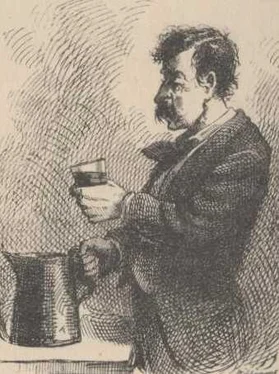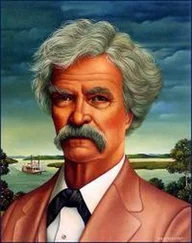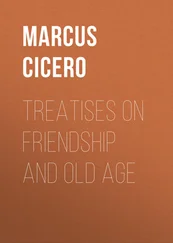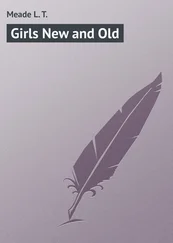Mark Twain - Sketches New and Old
Здесь есть возможность читать онлайн «Mark Twain - Sketches New and Old» весь текст электронной книги совершенно бесплатно (целиком полную версию без сокращений). В некоторых случаях можно слушать аудио, скачать через торрент в формате fb2 и присутствует краткое содержание. Год выпуска: 2004, Жанр: Классическая проза, Юмористическая проза, на английском языке. Описание произведения, (предисловие) а так же отзывы посетителей доступны на портале библиотеки ЛибКат.
- Название:Sketches New and Old
- Автор:
- Жанр:
- Год:2004
- ISBN:нет данных
- Рейтинг книги:5 / 5. Голосов: 1
-
Избранное:Добавить в избранное
- Отзывы:
-
Ваша оценка:
- 100
- 1
- 2
- 3
- 4
- 5
Sketches New and Old: краткое содержание, описание и аннотация
Предлагаем к чтению аннотацию, описание, краткое содержание или предисловие (зависит от того, что написал сам автор книги «Sketches New and Old»). Если вы не нашли необходимую информацию о книге — напишите в комментариях, мы постараемся отыскать её.
Sketches New and Old — читать онлайн бесплатно полную книгу (весь текст) целиком
Ниже представлен текст книги, разбитый по страницам. Система сохранения места последней прочитанной страницы, позволяет с удобством читать онлайн бесплатно книгу «Sketches New and Old», без необходимости каждый раз заново искать на чём Вы остановились. Поставьте закладку, и сможете в любой момент перейти на страницу, на которой закончили чтение.
Интервал:
Закладка:
HISTORY REPEATS ITSELF
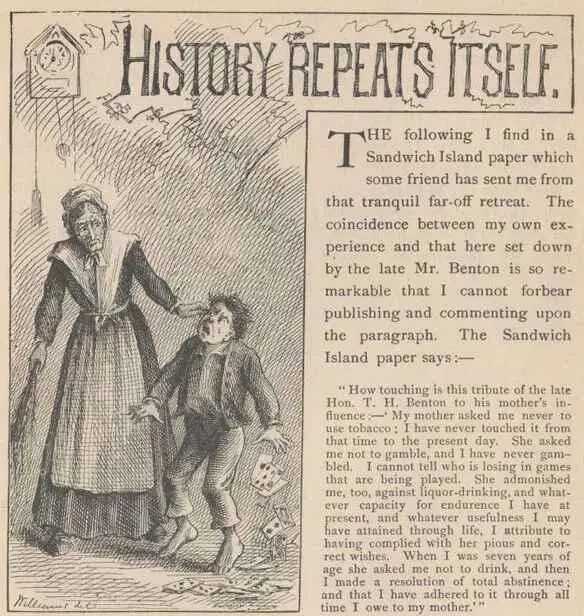
The following I find in a Sandwich Island paper which some friend has sent me from that tranquil far-off retreat. The coincidence between my own experience and that here set down by the late Mr. Benton is so remarkable that I cannot forbear publishing and commenting upon the paragraph. The Sandwich Island paper says:
How touching is this tribute of the late Hon. T. H. Benton to his mother's influence:—'My mother asked me never to use tobacco; I have never touched it from that time to the present day. She asked me not to gamble, and I have never gambled. I cannot tell who is losing in games that are being played. She admonished me, too, against liquor-drinking, and whatever capacity for endurance I have at present, and whatever usefulness I may have attained through life, I attribute to having complied with her pious and correct wishes. When I was seven years of age she asked me not to drink, and then I made a resolution of total abstinence; and that I have adhered to it through all time I owe to my mother.'
I never saw anything so curious. It is almost an exact epitome of my own moral career—after simply substituting a grandmother for a mother. How well I remember my grandmother's asking me not to use tobacco, good old soul! She said, "You're at it again, are you, you whelp? Now don't ever let me catch you chewing tobacco before breakfast again, or I lay I'll blacksnake you within an inch of your life!" I have never touched it at that hour of the morning from that time to the present day.
She asked me not to gamble. She whispered and said, "Put up those wicked cards this minute!—two pair and a jack, you numskull, and the other fellow's got a flush!"
I never have gambled from that day to this—never once—without a "cold deck" in my pocket. I cannot even tell who is going to lose in games that are being played unless I deal myself.
When I was two years of age she asked me not to drink, and then I made a resolution of total abstinence. That I have adhered to it and enjoyed the beneficent effects of it through all time, I owe to my grandmother. I have never drunk a drop from that day to this of any kind of water.
HONORED AS A CURIOSITY
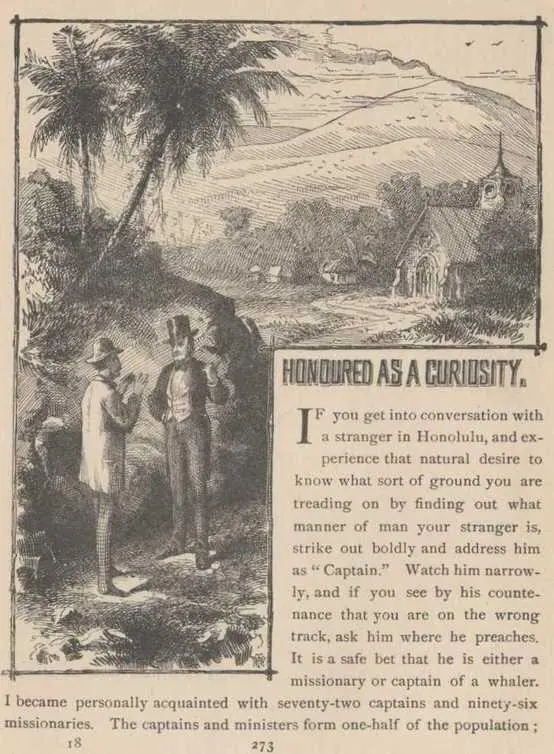
If you get into conversation with a stranger in Honolulu, and experience that natural desire to know what sort of ground you are treading on by finding out what manner of man your stranger is, strike out boldly and address him as "Captain." Watch him narrowly, and if you see by his countenance that you are on the wrong track, ask him where he preaches. It is a safe bet that he is either a missionary or captain of a whaler. I became personally acquainted with seventy-two captains and ninety-six missionaries. The captains and ministers form one-half of the population; the third fourth is composed of common Kanakas and mercantile foreigners and their families; and the final fourth is made up of high officers of the Hawaiian Government. And there are just about cats enough for three apiece all around.
A solemn stranger met me in the suburbs one day, and said:
"Good morning, your reverence. Preach in the stone church yonder, no doubt!"
"No, I don't. I'm not a preacher."
"Really, I beg your pardon, captain. I trust you had a good season. How much oil—"
"Oil! Why, what do you take me for? I'm not a whaler."
"Oh! I beg a thousand pardons, your Excellency. Major-General in the household troops, no doubt? Minister of the Interior, likely? Secretary of War? First Gentleman of the Bedchamber? Commissioner of the Royal—"
"Stuff, man! I'm not connected in any way with the government."
"Bless my life! Then who the mischief are you? what the mischief are you? and how the mischief did you get here? and where in thunder did you come from?"
"I'm only a private personage—an unassuming stranger—lately arrived from America."
"No! Not a missionary! not a whaler! not a member of his Majesty's government! not even a Secretary of the Navy! Ah! Heaven! it is too blissful to be true, alas! I do but dream. And yet that noble, honest countenance—those oblique, ingenuous eyes—that massive head, incapable of—of anything; your hand; give me your hand, bright waif. Excuse these tears. For sixteen weary years I have yearned for a moment like this, and—"
Here his feelings were too much for him, and he swooned away. I pitied this poor creature from the bottom of my heart. I was deeply moved. I shed a few tears on him, and kissed him for his mother. I then took what small change he had, and "shoved."
Part 7.
FIRST INTERVIEW WITH ARTEMUS WARD
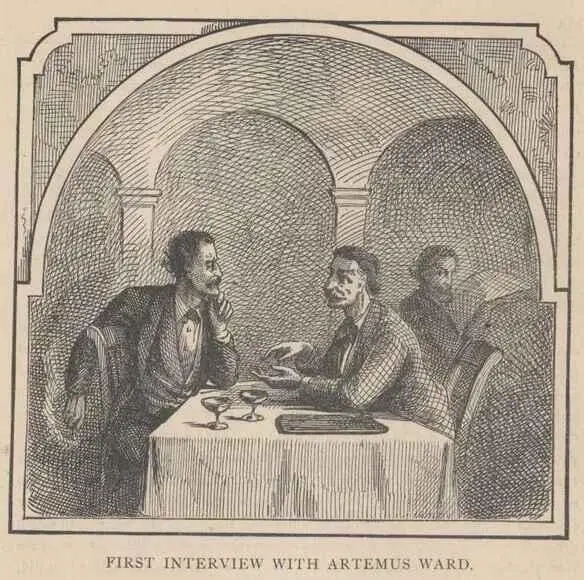
I had never seen him before. He brought letters of introduction from mutual friends in San Francisco, and by invitation I breakfasted with him. It was almost religion, there in the silver-mines, to precede such a meal with whisky cocktails. Artemus, with the true cosmopolitan instinct, always deferred to the customs of the country he was in, and so he ordered three of those abominations. Hingston was present. I said I would rather not drink a whisky cocktail. I said it would go right to my head, and confuse me so that I would be in a helpless tangle in ten minutes. I did not want to act like a lunatic before strangers. But Artemus gently insisted, and I drank the treasonable mixture under protest, and felt all the time that I was doing a thing I might be sorry for. In a minute or two I began to imagine that my ideas were clouded. I waited in great anxiety for the conversation to open, with a sort of vague hope that my understanding would prove clear, after all, and my misgivings groundless.
Artemus dropped an unimportant remark or two, and then assumed a look of superhuman earnestness, and made the following astounding speech. He said:
"Now there is one thing I ought to ask you about before I forget it. You have been here in Silver land—here in Nevada—two or three years, and, of course, your position on the daily press has made it necessary for you to go down in the mines and examine them carefully in detail, and therefore you know all about the silver-mining business. Now what I want to get at is—is, well, the way the deposits of ore are made, you know. For instance. Now, as I understand it, the vein which contains the silver is sandwiched in between casings of granite, and runs along the ground, and sticks up like a curb stone. Well, take a vein forty feet thick, for example, or eighty, for that matter, or even a hundred—say you go down on it with a shaft, straight down, you know, or with what you call 'incline' maybe you go down five hundred feet, or maybe you don't go down but two hundred—anyway, you go down, and all the time this vein grows narrower, when the casings come nearer or approach each other, you may say—that is, when they do approach, which, of course, they do not always do, particularly in cases where the nature of the formation is such that they stand apart wider than they otherwise would, and which geology has failed to account for, although everything in that science goes to prove that, all things being equal, it would if it did not, or would not certainly if it did, and then, of course, they are. Do not you think it is?"
Читать дальшеИнтервал:
Закладка:
Похожие книги на «Sketches New and Old»
Представляем Вашему вниманию похожие книги на «Sketches New and Old» списком для выбора. Мы отобрали схожую по названию и смыслу литературу в надежде предоставить читателям больше вариантов отыскать новые, интересные, ещё непрочитанные произведения.
Обсуждение, отзывы о книге «Sketches New and Old» и просто собственные мнения читателей. Оставьте ваши комментарии, напишите, что Вы думаете о произведении, его смысле или главных героях. Укажите что конкретно понравилось, а что нет, и почему Вы так считаете.
